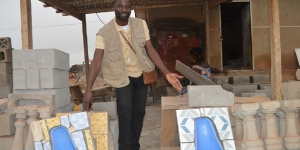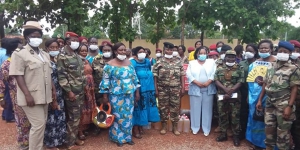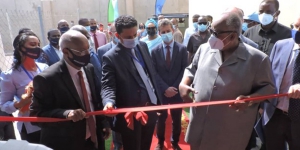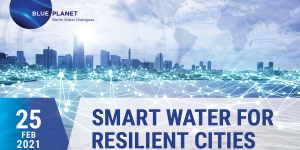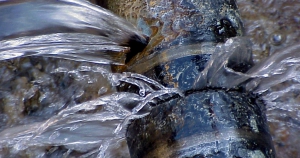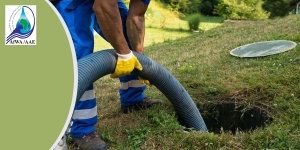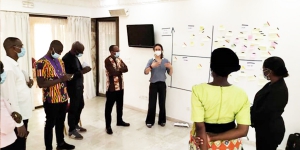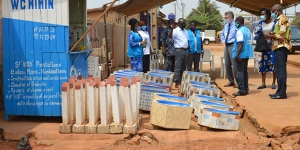Nzickonan Stéphanie
Municipal WASH Communities of Practice: Why MuniWASH Relies On Umbrella Associations
The Municipal Water, Sanitation, and Hygiene (MuniWASH) project funded by the United States Agency for International Development (USAID) and implemented by Tetra Tech in Benin and in Côte d'Ivoire in collaboration with the African Water Association (AfWA) is supporting the Association Nationale des Communes du Bénin (ANCB) and the Union des Villes et Communes de Côte d'Ivoire (UVICOCI) to create and organize communities of practice focused on the management of water, sanitation, and hygiene (WASH) for local municipalities.
The proposed communities of practice will bring together mayors and those in charge of technical or operational services in the municipalities to share knowledge and build on successful methods of managing water and sanitation services. ANCB in Benin and UVICOCI in Côte d'Ivoire represent all municipalities in each country, which makes them ideal partners to identify needs and support collaboration between municipalities and the project. MuniWASH relies on the experience of these umbrella organizations to develop a culture of exchange and promote sharing of good practices in management and extension of water and sanitation services.
The primary vision of the community of practice is to share between municipalities good practices in water and sanitation services delivery. The deconcentrated services in charge of water and sanitation management at the local level will participate to community of practice meetings according to themes requiring their expertise and intervention. Also, MuniWASH will provide the community of practice with a pool of experts to share their knowledge for the benefit of members of the municipal community of practice according to the targeted themes.
Implemented in 16 municipalities in Benin and Côte d'Ivoire (eight in each country), the MuniWASH project started in September 2019 and aims to facilitate coordination between public and private actors and target municipalities to improve urban populations' access to better water and sanitation services by targeting poor and underserved populations in particular. The project is contributing to improving urban WASH service delivery by facilitating private investment, technical and operational capacity building, good governance, and learning and knowledge sharing.
UVICOCI, through its Secretary General Mrs. Harlette N'Guessan, welcomed the establishment of this community of practice stating: "it is a good initiative that will allow municipalities to be in permanent contact but also to learn from each other."In Benin, Mr. Sègla Lihoussou, Executive Director of ANCB, and Ms. Alladatin Emenique, ANCB Technical Assistant for WASH, supported the initiative and encouraged the MuniWASH team to do everything possible to ensure that this community of practice engages municipalities for continued collaboration. Mr. Lihoussou requested that MuniWASH "develop attractive themes [to keep the communes ] interested in this community of practice.” These could include good practices in strategic planning and resource mobilization for financing the water and sanitation sector by municipalities, technological innovations in tools and equipment for municipal management of water and sanitation services, and successful models for strengthening the regulatory framework for the WASH sector.
To be useful to participants, the communities of practice must understand needs and communicate information effectively. MuniWASH breaks this work down into several phases: identification, documentation, dissemination and sharing to leverage experiences for learning. During its implementation, MuniWASH is producing learning notes developed from the experiences of the project, which are being disseminated through digital platforms and during WASH events to different audiences of professionals and public actors. MuniWASH is also working with ANCB and UVICOCI communities of practice members’ to promote bilateral experience sharing and to use their website to publish its learning notes on a virtual library. During its implementation MuniWASH will develop 90 learning notes that will be disseminated through electronic channels such as the African Water Association's knowledge sharing platform. MuniWASH will use the opportunities of the quarterly AfWA meetings to share the learning and knowledge of the project with all participants in order to increase the opportunities of dissemination of the learning products that will be produced.
.
PSI/ Success story: a bright future due to an improbable profession
After years of unsuccessful work in masonry, Mr. Dosso wondered about improving his quality of life and that of his family.
He was approached by an municipality agent of OUME where he has been living for few years.
This man presented to him the lucrative possibilities related to the installation of toilets and "SaniPlus" structures developed through the Sanitation Service Delivery (SSD) project implemented by the American NGO PSI-CI..
Convinced of the positive change that the use of improved toilets in rural and urban areas could bring, Dosso works hard to be qualify as an entrepreneur in the city of Oumé. It has strengthened its skills in the manufacture of “SaniPlus” toilets. Then, creates his company called “ETS Dosso” located in Oumé, in the “Yaofla” district.
Despite difficult beginnings, Dosso traveled through households and villages to promote his company and its products, including those offered by “SaniPlus”.
A few months later, the quality of "SaniPlus" works and the feedback from satisfied households echoed its know-how in the city and surroundings of Oumé.
For the sake of fine-tuning its strategy, Dosso joins forces with a brick and broom factory to better sell its production.
This approach will pay off and give him the ability to bulk purchase gravel and own a tricycle to facilitate his growing deliveries. Very quickly, its "SaniPlus" toilet facilities in rural areas will surge and provide it with the necessary resources to consider opening a second point of sale in the near future.
Today, Dosso dreams of conquering neighboring towns through "SaniPlus" outlets.
RECAFPEA donates to military women in Central African Republic
The Centrafrican Network of Professional Women in Water and Sanitation (RECAFPEA) made a significant food and non-food donation to the country's military women. This action, according to the president of the Network, Irène KAGAMA, was intended to provide emotional and material support to these mothers who are on the front line to fight against the great insecurity in the country. ''We decided to give them our support, our gratitude and our encouragement because they risk their lives to protect ours''. She said.
The donation ceremony was sponsored by the First Lady of the Republic of Central Africa, Mrs. Brigitte TOUADERA, who congratulated the members of RECAFPEA for this initiative and asked them to perpetuate such actions. The military women, for their part, received these gifts from their civilian sisters with great joy. They expressed their gratitude to their donors and assured them of their commitment to serve the nation with loyalty for the restoration of peace and security.
The Centrafrican Network of Professional Women in Water and Sanitation (RECAFPEA) was created in 2019 and has over 30 active members to date.
The National Office of Water and Sanitation of Djibouti (ONEAD) inaugurates its seawater desalination plant
The President of the Republic of Djibouti, H.E. Ismael Omar GUELLEH, inaugurated the desalination and drinking water production plant in Doraleh. The plant is funded by the European Union for 73 million euros and by the Djiboutian government for 5.5 million euros. This ceremony marks a step forward and a technical progress for the Republic of Djibouti.
The plant will first produce 22,500 m³ of drinking water per day to supply nearly 250,000 inhabitants. This capacity will double in phase 2 to 45,000 m³/day. This project is part of the program to fight against water shortage and complements the water coming from the cross-border supply with Ethiopia. The water produced by this plant will be sent to storage tanks and distributed to consumers to meet the ever-increasing demand of the population of Djibouti.
The plant was built by the Franco-Spanish company Eiffage/Tedagua. For the next 5 years, it will be under an operating contract with the company Tedagua, and ONEAD staff will be trained during this period. Thus, ONEAD will be fully capable of ensuring service continuity.
BLUE PLANET Berlin Water Dialogues virtual event attracts representatives from the African water sector
2021’s first BLUE PLANET Berlin Water Dialogues was special in two ways: On 25th February, the conference format not only celebrated its 10th anniversary but also its digital premiere. Debates around solutions to the challenges of global water management took place entirely virtually, allowing nearly 700 participants worldwide to join this vibrant conference and interact with speakers and other guests. High-ranking international guest speakers presented innovations in asset management processes and discussed water utilities in smart cities. The organizers were particularly pleased with the turnout of international guests. Attendees from African countries – who made up 20% of the participants from outside the EU – showed high interest in the project presentations and in the exchange that followed in interactive break-out sessions as well as the interactive networking tool. The virtual afternoon has once again proven that international collaboration is imperative in addressing global challenges of the water sector. As water is not yet sufficiently featured in the smart city debate, global events such as BLUE PLANET Berlin Water Dialogues are a first step towards changing this. Many promising projects and innovations are already underway. Together, the water industry can create a sustainable water strategy for the future.
BLUE PLANET Berlin Water Dialogues is an established series of events in the international water sector. It was created in 2011, with the goal of being an evolving platform for exchanging knowledge, ideas, and experiences about solutions to improve the global water situation. The next event is planned to be held in November 2021.
Read a full summary report of the event here. To view video recordings of the sessions and download the speakers’ presentations click here.
Water Management: AfWA wants to train 41 auditors to support water utilities for better management of Non-Revenue Water (NRW)
With funding from the U.S. Agency for International Development (USAID), the African Water Association (AfWA) has developed from 2012 to 2015, a major program entitled, « Further Advance Blue Revolution Initiative (FABRI) » for the capacity building of water utilities to reduce Non-Revenue Water (NRW) in Sub-Saharan Africa. This program enabled 19 African water utilities to improve their performance through the identification of short- and medium-term actions to substantially reduce NRW in these utilities and thus postpone some investments.
To ensure a smooth development of this program, a Task Force composed of 14 African technical experts from 13 water utilities in 12 countries was created and its members were trained in auditing water utilities in NRW management, between 2012 and 2018.
However, changes in the water utilities (retirements, promotions, changes in positions of responsibility, etc.) have created a scattering of network members, leading AfWA to form a new group of auditors to support the utilities, within the framework of its AfriCap program (AfWA Capacity Building Program - NRW Component).
Thus, in order to relaunch the audit operations on NRW in a dozen companies requesting services from the AfWA, the Association is organizing in the coming days, a refresher course on NWR for auditors members of the Task Force.
The objective of the training, according to Mr. Gilles DJAGOUN, Senior Coordinator of the Water Program in charge of AfriCap of AfWA, is to consolidate the knowledge of the auditors in order to conduct an audit on NRW. Specifically, it is to strengthen their capacity on the use of the EASYCALC software and to design a standard audit framework on NRW.
Considering the current health context marked by COVID19, the training of the auditors will be done online. The auditors involved come from Angola, Benin, Burkina Faso, Cameroon, Central African Republic, Côte d'Ivoire, Ghana, Guinea-Conakry, Mali, Niger, Senegal, Togo and Malawi.
About the AfriCap program
The African Water Association Capacity Building Program (AfriCap) is funded by USAID for the period 2015-2022. This program aims to support AfWA in its mandate to build the capacity of African stakeholders in the water, sanitation and hygiene sector through (i) the dissemination of knowledge and good practices, (ii) peer-to-peer learning partnerships on the three themes: Non-Revenue Water (NWR), Water Quality (WQ) and CityWide Inclusive Sanitation (CWIS) and (iii) institutional capacity building of AfWA.
Non-sewered sanitation: launching of the capacity building activities for AfWA and African operators for better sanitation service delivery
After a long period of lethargy due to the sudden death of its Coordinator, late Professor Ives Magloire KENGNE, the activities of the AfWA Sanitation program, and in particular the SAO-CWIS project (Capacity Building Project for AfWA and Operators for the Implementation of Inclusive Sanitation in African Cities) are resuming back with the new Coordinator, Dr. Mbaye MBEGUERE.
Thus, for an effective start of the activities of this program, a launching workshop will be held in May in the African beneficiary countries. The purpose of this workshop is to identify the key sanitation actors in the countries targeted; to clearly present to the main components of the project and expectations to those actor; to present and discuss the short and mid-term action plan of the project; and to agree on the commitments of the parties involved (AfWA, Regional Implementing Partners, beneficiaries, mentors, other key actors).
The AfWA Sanitation Program is funded by the Bill & Melinda Gates Foundation and the United States Agency for International Development (USAID) through the SAO-CWIS project and the AfriCap project respectively. These projects aim to strengthen the capacity of AfWA itself as well as public and private sanitation operators to deliver inclusive urban sanitation services. This will be done through peer-to-peer learning partnerships, trainings, networking and advocacy so that more than ten million people in thirty cities in Sub-Saharan Africa will have access to adequate and sustainable sanitation. The beneficiary countries of this project are: Cameroon, Chad, Côte d'Ivoire, Ethiopia, Ghana, Guinea Conakry, Kenya, Malawi, Niger, Nigeria, DRC, Sierra Leone, Togo and Zambia.
Through the implementation of this program, AfWA intends to contribute to the improvement of the worrying situation of access to adequate sanitation services in African cities.
Capacity Building: AfWA organizes Audit of its Internal Communication Processes
AfWA has grown exponentially in recent years in terms of services, portfolio, network reach, and staff size. After such organizational development, it is necessary to review and adapt internal communication practices and processes.
To this end, and with funding from its partner, German Water Partnership (GWP), AfWA initiated an Audit of its communication processes and practices. The launching workshop took place on March 23 and 24, 2021 in Abidjan, in the presence of Nathalie Kolbe, GAPWAS Project Director, representing GWP at the Association's headquarters and Mr. Sylvain Usher, AfWA’s Executive Director. During this first step, and with the help of consultants, Jean de Dieu Cirhigiri from the Democratic Republic of Congo (DRC), and Kristin Horn from Germany, the workshop participants, members of the AfWA’ staff, were led to identify and analyze the different cases of communication with the help of an evaluation tool; the objective being to obtain a clearer picture of the roles and internal processes. During the two-day workshop, participants were able to identify a variety of processes related to the different positions within the Association.
The second step of the audit, which will take place later this semester, will be to analyze the identified processes, to identify strengths and weaknesses, and to reach a common understanding of the desired internal communication.
About German Water Partnership:
German Water Partnership is an internationally oriented network of the German water sector that unites about 350 companies, professional associations and institutions from the economic, scientific and research sectors.
About the partnership between AfWA and German Water Partnership
The cooperation between AfWA and German Water Partnership started in 2012 and was formalized in 2019 through the signing of a partnership that consists of, among other things, expertise exchanges, consulting and capacity building.
Sanitation Service Delivery: Sanitation products entrepreneurs assure about the provision of “WC MIMIN “products to households after the project has closed during a field visit by a USAID delegation
Funded by the United States Agency for International Development (USAID) since 2014, the urban sanitation service delivery program (SSD), trains and encourages private sector actors (masons and concrete ring manufacturers etc.) to provide commercial services of affordable and quality sanitation products and services to low-income households residing in urban and peri-urban areas. Implemented by Population Services International (PSI), the project trained and operationalized 34 micro-entrepreneurs and 130 masons for the construction of sanitation facilities in 20 municipalities in Benin under the "WC Mimin" label. These include alternative-use double-pit latrines, improved single-pit latrines and defecation seats to improve unimproved latrines.
Concerned about the effective continuity of the supply of WC MIMIN products at the end of the project envisaged for the end of September 2021, a delegation from USAID met on Thursday February 25, the two (02) micro entrepreneurs installed in the department of Zou in favor of a follow-up visit. Through direct exchanges, these manufactures partners shared with the said delegation their own approach to canvassing customer as well as their perspective.
Indeed, very small entrepreneurs use some community health workers already paid by certain health districts and motorcycle taxi drivers for canvassing customers. They offer the MIMIN WC products to visited customers for a commission of 1000 to 3000 CFA depending on the product sold. This additional income is a real motivation for these players who constantly raise the awareness of potential consumers whenever necessary. Thanks to their actions in the field, the very small entrepreneurs manage to install four to five defecations seats per day. Which strongly contributes to the development of their business.
The vision of these micro entrepreneurs si to increasing the number of points of sale in strategic locations in the target locality. The aim of these outlets is to bring products closer to consumers, one of the value propositions offered by the WC MIMIN business model.
In turn, the delegation welcomed the formidable initiatives being implemented by micro entrepreneurs in order to guarantee the supply of WC MIMIN products to households at the end of the project. This bodes well for the sustainability of their services for the happiness of low income populations.
The 21st AfWA International Congress and Exhibition of Guinea Conakry 2022 is postponed to July 2022
Initially planned to be held in February 2022 in Guinea Conakry, the 21st International Congress and Exhibition of AfWA has been postponed by a few months and could be held in July 2022 still in Guinea Conakry. This was decided by the Executive Board at its meeting of March 30, 2021. The main reason for this postponement is the proximity with the new date of the 9th World Water Forum which was scheduled from 21 to 26 March 2021 in Dakar, Senegal and which, for reasons of health crisis has been postponed to March 2022.
Thus, to avoid the overlapping of activities with the same actors involved, and considering AfWA’s partnership with the World Water Council as well as the main role that each of these institutions will have to play in the organization of peer's event, AfWA’s Executive Board in collaboration with the 21st Congress’ Local Organizing Committee, has decided to postpone this event. The 21st AfWA International Congress and Exhibition will therefore be held in July 2022 in Guinea Conakry, under the aegis of the water utility of Guinea (SEG, Société des Eaux de Guinée).
About AfWA International Congress
AfWA International Congress and Exhibition is the largest and most important rendez-vous of the water and sanitation on the African continent. It is a biennial scientific and technical forum to take stock of progress and recent achievements, and to share experiences and technology advances as well in the water, sanitation, and environment sector in Africa.

 English
English  Français
Français 

